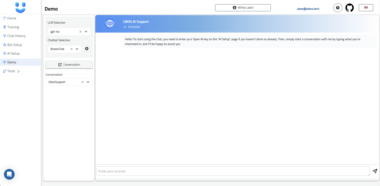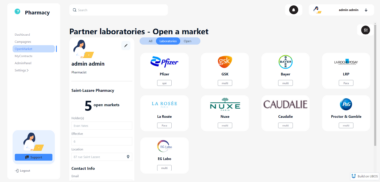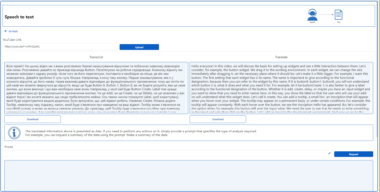
browser-use MCP server

Project Note: This MCP server implementation builds upon the browser-use/web-ui foundation. Core browser automation logic and configuration patterns are adapted from the original project.
AI-driven browser automation server implementing the Model Context Protocol (MCP) for natural language browser control and web research.
Features
MCP Integration - Full protocol implementation for AI agent communication.
Browser Automation - Page navigation, form filling, element interaction via natural language (
run_browser_agenttool).Visual Understanding - Optional screenshot analysis for vision-capable LLMs.
State Persistence - Option to manage a browser session across multiple MCP calls or connect to user's browser.
Multi-LLM Support - Integrates with OpenAI, Anthropic, Azure, DeepSeek, Google, Mistral, Ollama, OpenRouter, Alibaba, Moonshot, Unbound AI.
Deep Research Tool - Dedicated tool for multi-step web research and report generation (
run_deep_searchtool).Environment Variable Configuration - Fully configurable via environment variables.
CDP Connection - Ability to connect to and control a user-launched Chrome/Chromium instance via Chrome DevTools Protocol.
Quick Start
Prerequisites
- Python 3.11 or higher
uv(fast Python package installer):pip install uv- Chrome/Chromium browser installed
- Install Playwright browsers:
uv syncand thenuv run playwright install
Integration with MCP Clients (e.g., Claude Desktop)
You can configure clients like Claude Desktop to connect to this server. Add the following structure to the client's configuration (e.g., claude_desktop_config.json), adjusting the path and environment variables as needed:
// Example for Claude Desktop config
"mcpServers": {
"browser-use": {
// Option 1: Run installed package
// "command": "uvx",
// "args": ["mcp-server-browser-use"],
// Option 2: Run from local development source
"command": "uvx",
"args": [
"mcp-server-browser-use"
],
"env": {
// --- CRITICAL: Add required API keys here ---
"OPENAI_API_KEY": "YOUR_KEY_HERE_IF_USING_OPENAI",
"ANTHROPIC_API_KEY": "YOUR_KEY_HERE_IF_USING_ANTHROPIC",
// ... add other keys based on MCP_MODEL_PROVIDER ...
// --- Optional Overrides (defaults are usually fine) ---
"MCP_MODEL_PROVIDER": "anthropic", // Default provider
"MCP_MODEL_NAME": "claude-3-7-sonnet-20250219", // Default model
"BROWSER_HEADLESS": "true", // Default: run browser without UI
"BROWSER_USE_LOGGING_LEVEL": "INFO",
// --- Example for connecting to your own browser ---
// "MCP_USE_OWN_BROWSER": "true",
// "CHROME_CDP": "http://localhost:9222",
// Ensure Python uses UTF-8
"PYTHONIOENCODING": "utf-8",
"PYTHONUNBUFFERED": "1",
"PYTHONUTF8": "1"
}
}
}
Important: Ensure the command and args correctly point to how you want to run the server (either the installed package or from the source directory). Set the necessary API keys in the env section.
MCP Tools
This server exposes the following tools via the Model Context Protocol:
Synchronous Tools (Wait for Completion)
run_browser_agent- Description: Executes a browser automation task based on natural language instructions and waits for it to complete. Uses settings prefixed with
MCP_(e.g.,MCP_HEADLESS,MCP_MAX_STEPS). - Arguments:
task(string, required): The primary task or objective.add_infos(string, optional): Additional context or hints for the agent (used bycustomagent type).
- Returns: (string) The final result extracted by the agent or an error message.
- Description: Executes a browser automation task based on natural language instructions and waits for it to complete. Uses settings prefixed with
run_deep_search- Description: Performs in-depth web research on a topic, generates a report, and waits for completion. Uses settings prefixed with
MCP_RESEARCH_and generalBROWSER_settings (e.g.,BROWSER_HEADLESS). - Arguments:
research_task(string, required): The topic or question for the research.max_search_iterations(integer, optional, default: 10): Max search cycles.max_query_per_iteration(integer, optional, default: 3): Max search queries per cycle.
- Returns: (string) The generated research report in Markdown format, including the file path, or an error message.
- Description: Performs in-depth web research on a topic, generates a report, and waits for completion. Uses settings prefixed with
Configuration (Environment Variables)
Configure the server using environment variables. You can set these in your system or place them in a .env file in the project root.
| Variable | Description | Required? | Default Value | Example Value |
| :------------------------------ | :------------------------------------------------------------------------------------------------------ | :----------------------------- | :-------------------------------- | :-------------------------------- |
| LLM Settings | | | | |
| MCP_MODEL_PROVIDER | LLM provider to use. See options below. | Yes | anthropic | openai |
| MCP_MODEL_NAME | Specific model name for the chosen provider. | No | claude-3-7-sonnet-20250219 | gpt-4o |
| MCP_TEMPERATURE | LLM temperature (0.0-2.0). Controls randomness. | No | 0.0 | 0.7 |
| MCP_TOOL_CALLING_METHOD | Method for tool invocation ('auto', 'jsonschema', 'functioncalling'). Affects run_browser_agent. | No | auto | json_schema |
| MCP_MAX_INPUT_TOKENS | Max input tokens for LLM context for run_browser_agent. | No | 128000 | 64000 |
| MCP_BASE_URL | Optional: Generic override for the LLM provider's base URL. | No | Provider-specific | http://localhost:8080/v1 |
| MCP_API_KEY | Optional: Generic override for the LLM provider's API key (takes precedence over provider-specific keys). | No | - | sk-... |
| Provider API Keys | Required based on MCP_MODEL_PROVIDER unless MCP_API_KEY is set. | | | |
| OPENAI_API_KEY | API Key for OpenAI. | If Used | - | sk-... |
| ANTHROPIC_API_KEY | API Key for Anthropic. | If Used | - | sk-ant-... |
| GOOGLE_API_KEY | API Key for Google AI (Gemini). | If Used | - | AIza... |
| AZURE_OPENAI_API_KEY | API Key for Azure OpenAI. | If Used | - | ... |
| DEEPSEEK_API_KEY | API Key for DeepSeek. | If Used | - | sk-... |
| MISTRAL_API_KEY | API Key for Mistral AI. | If Used | - | ... |
| OPENROUTER_API_KEY | API Key for OpenRouter. | If Used | - | sk-or-... |
| ALIBABA_API_KEY | API Key for Alibaba Cloud (DashScope). | If Used | - | sk-... |
| MOONSHOT_API_KEY | API Key for Moonshot AI. | If Used | - | sk-... |
| UNBOUND_API_KEY | API Key for Unbound AI. | If Used | - | ... |
| Provider Endpoints | Optional: Override default API endpoints. | | | |
| OPENAI_ENDPOINT | OpenAI API endpoint URL. | No | https://api.openai.com/v1 | |
| ANTHROPIC_ENDPOINT | Anthropic API endpoint URL. | No | https://api.anthropic.com | |
| AZURE_OPENAI_ENDPOINT | Required if using Azure. Your Azure resource endpoint. | If Used | - | https://res.openai.azure.com/ |
| AZURE_OPENAI_API_VERSION | Azure API version. | No | 2025-01-01-preview | 2023-12-01-preview |
| DEEPSEEK_ENDPOINT | DeepSeek API endpoint URL. | No | https://api.deepseek.com | |
| MISTRAL_ENDPOINT | Mistral API endpoint URL. | No | https://api.mistral.ai/v1 | |
| OLLAMA_ENDPOINT | Ollama API endpoint URL. | No | http://localhost:11434 | http://ollama.local:11434 |
| OPENROUTER_ENDPOINT | OpenRouter API endpoint URL. | No | https://openrouter.ai/api/v1 | |
| ALIBABA_ENDPOINT | Alibaba (DashScope) API endpoint URL. | No | https://dashscope...v1 | |
| MOONSHOT_ENDPOINT | Moonshot API endpoint URL. | No | https://api.moonshot.cn/v1 | |
| UNBOUND_ENDPOINT | Unbound AI API endpoint URL. | No | https://api.getunbound.ai | |
| Ollama Specific | | | | |
| OLLAMA_NUM_CTX | Context window size for Ollama models. | No | 32000 | 8192 |
| OLLAMA_NUM_PREDICT | Max tokens to predict for Ollama models. | No | 1024 | 2048 |
| Agent Settings (run_browser_agent) | | | | |
| MCP_AGENT_TYPE | Agent implementation for run_browser_agent ('org' or 'custom'). | No | org | custom |
| MCP_MAX_STEPS | Max steps per agent run. | No | 100 | 50 |
| MCP_USE_VISION | Enable vision capabilities (screenshot analysis). | No | true | false |
| MCP_MAX_ACTIONS_PER_STEP | Max actions per agent step. | No | 5 | 10 |
| MCP_KEEP_BROWSER_OPEN | Keep browser managed by server open between run_browser_agent calls (if MCP_USE_OWN_BROWSER=false). | No | false | true |
| MCP_ENABLE_RECORDING | Enable Playwright video recording for run_browser_agent. | No | false | true |
| MCP_SAVE_RECORDING_PATH | Path to save agent run video recordings (Required if MCP_ENABLE_RECORDING=true). | If Recording | - | ./tmp/recordings |
| MCP_AGENT_HISTORY_PATH | Directory to save agent history JSON files. | No | ./tmp/agent_history | ./agent_runs |
| MCP_HEADLESS | Run browser without UI specifically for run_browser_agent tool. | No | true | false |
| MCP_DISABLE_SECURITY | Disable browser security features specifically for run_browser_agent tool (use cautiously). | No | true | false |
| Deep Research Settings (run_deep_search) | | | | |
| MCP_RESEARCH_MAX_ITERATIONS | Max search iterations for deep research. | No | 10 | 5 |
| MCP_RESEARCH_MAX_QUERY | Max search queries per iteration. | No | 3 | 5 |
| MCP_RESEARCH_USE_OWN_BROWSER | Use a separate browser instance for research (requires CHROME_CDP if MCP_USE_OWN_BROWSER=true). | No | false | true |
| MCP_RESEARCH_SAVE_DIR | Directory to save research artifacts (report, results). | No | ./tmp/deep_research/{task_id} | ./research_output |
| MCP_RESEARCH_AGENT_MAX_STEPS | Max steps for sub-agents within deep research. | No | 10 | 15 |
| Browser Settings (General & Specific Tool Overrides) | | | | |
| MCP_USE_OWN_BROWSER | Set to true to connect to user's browser via CHROME_CDP instead of launching a new one. | No | false | true |
| CHROME_CDP | Connect to existing Chrome via DevTools Protocol URL. Required if MCP_USE_OWN_BROWSER=true. | If MCP_USE_OWN_BROWSER=true | - | http://localhost:9222 |
| BROWSER_HEADLESS | Run browser without visible UI. Primarily affects run_deep_search. See also MCP_HEADLESS. | No | true | false |
| BROWSER_DISABLE_SECURITY | General browser security setting. See also MCP_DISABLE_SECURITY. | No | false | true |
| CHROME_PATH | Path to Chrome/Chromium executable. | No | - | /usr/bin/chromium-browser |
| CHROME_USER_DATA | Path to Chrome user data directory (for persistent sessions, useful with CHROME_CDP). | No | - | ~/.config/google-chrome/Profile 1 |
| BROWSER_TRACE_PATH | Directory to save Playwright trace files (useful for debugging). | No | ./tmp/trace | ./traces |
| BROWSER_WINDOW_WIDTH | Browser window width (pixels). | No | 1280 | 1920 |
| BROWSER_WINDOW_HEIGHT | Browser window height (pixels). | No | 720 | 1080 |
| Server & Logging | | | | |
| LOG_FILE | Path for the server log file. | No | mcp_server_browser_use.log | /var/log/mcp_browser.log |
| BROWSER_USE_LOGGING_LEVEL | Logging level (DEBUG, INFO, WARNING, ERROR, CRITICAL). | No | INFO | DEBUG |
| ANONYMIZED_TELEMETRY | Enable/disable anonymized telemetry (true/false). | No | true | false |
Supported LLM Providers (MCP_MODEL_PROVIDER):
openai, azure_openai, anthropic, google, mistral, ollama, deepseek, openrouter, alibaba, moonshot, unbound
Connecting to Your Own Browser (CDP)
Instead of having the server launch and manage its own browser instance, you can connect it to a Chrome/Chromium browser that you launch and manage yourself. This is useful for:
- Using your existing browser profile (cookies, logins, extensions).
- Observing the automation directly in your own browser window.
- Debugging complex scenarios.
Steps:
Launch Chrome/Chromium with Remote Debugging Enabled: Open your terminal or command prompt and run the command appropriate for your operating system. This tells Chrome to listen for connections on a specific port (e.g., 9222).
macOS:
/Applications/Google\ Chrome.app/Contents/MacOS/Google\ Chrome --remote-debugging-port=9222(Adjust the path if Chrome is installed elsewhere)
Linux:
google-chrome --remote-debugging-port=9222 # or chromium-browser --remote-debugging-port=9222Windows (Command Prompt):
"C:\Program Files\Google\Chrome\Application\chrome.exe" --remote-debugging-port=9222(Adjust the path to your Chrome installation if necessary)
Windows (PowerShell):
powershell & "C:\Program Files\Google\Chrome\Application\chrome.exe" --remote-debugging-port=9222(Adjust the path to your Chrome installation if necessary)
Note: If port 9222 is already in use, choose a different port (e.g., 9223) and use that same port in the
CHROME_CDPenvironment variable.Configure Environment Variables: Set the following environment variables in your
.envfile or system environment before starting the MCP server:MCP_USE_OWN_BROWSER=true CHROME_CDP=http://localhost:9222 # Use the same port you launched Chrome withMCP_USE_OWN_BROWSER=true: Tells the server to connect to an existing browser instead of launching one.CHROME_CDP: Specifies the URL where the server can connect to your browser's DevTools Protocol endpoint.
Run the MCP Server: Start the server as usual:
bash uv run mcp-server-browser-use
Now, when you use the run_browser_agent or run_deep_search tools, the server will connect to your running Chrome instance instead of creating a new one.
Important Considerations:
- The browser launched with
--remote-debugging-portmust remain open while the MCP server is running and needs to interact with it. - Ensure the
CHROME_CDPURL is accessible from where the MCP server is running (usuallyhttp://localhost:PORTif running on the same machine). - Using your own browser means the server inherits its state (open tabs, logged-in sessions). Be mindful of this during automation.
- Settings like
MCP_HEADLESS,BROWSER_HEADLESS,MCP_KEEP_BROWSER_OPENare ignored whenMCP_USE_OWN_BROWSER=true. Window size is determined by your browser window.
Development
# Install dev dependencies and sync project deps
uv sync --dev
# Install playwright browsers
uv run playwright install
# Run with debugger (Example connecting to own browser via CDP)
# 1. Launch Chrome: google-chrome --remote-debugging-port=9222
# 2. Run inspector command:
npx @modelcontextprotocol/inspector@latest \
-e ANTHROPIC_API_KEY=$ANTHROPIC_API_KEY \
-e MCP_MODEL_PROVIDER=anthropic \
-e MCP_MODEL_NAME=claude-3-7-sonnet-20250219 \
-e MCP_USE_OWN_BROWSER=true \
-e CHROME_CDP=http://localhost:9222 \
uv --directory . run mcp run src/mcp_server_browser_use/server.py
# Note: Change timeout in inspector's config panel if needed (default is 10 seconds)
Troubleshooting
- Browser Conflicts: If not using
CHROME_CDP(MCP_USE_OWN_BROWSER=false), ensure no other conflicting Chrome instances are running with the same user data directory ifCHROME_USER_DATAis specified. - CDP Connection Issues: If using
MCP_USE_OWN_BROWSER=true:- Verify Chrome was launched with the
--remote-debugging-portflag. - Ensure the port in
CHROME_CDPmatches the port used when launching Chrome. - Check for firewall issues blocking the connection to the specified port.
- Make sure the browser is still running.
- Verify Chrome was launched with the
- API Errors: Double-check that the correct API key environment variable (
OPENAI_API_KEY,ANTHROPIC_API_KEY, etc.) is set for your chosenMCP_MODEL_PROVIDER, or thatMCP_API_KEYis set. Verify keys and endpoints (AZURE_OPENAI_ENDPOINTis required for Azure). - Vision Issues: Ensure
MCP_USE_VISION=trueif using vision features and that your selected LLM model supports vision. - Dependency Problems: Run
uv syncto ensure all dependencies are correctly installed. Checkpyproject.toml. - Logging: Check the log file specified by
LOG_FILE(default:mcp_server_browser_use.log) for detailed error messages. IncreaseBROWSER_USE_LOGGING_LEVELtoDEBUGfor more verbose output.
License
MIT - See LICENSE for details.
Browser Use MCP Server
Project Details
- wenpingwu001/mcp-browser-use
- MIT License
- Last Updated: 4/9/2025
Categories
Recomended MCP Servers
Yuque mcp server
Installs MCPs in cursor for you, give it a git URL and let it rip
DiffuGen is a powerful yet user-friendly interface for localedge image generation. Built on the Model Control Protocol (MCP),...
A Model Context Protocol (MCP) server for TfNSW's realtime alerts API


The official ElevenLabs MCP server

An MCP server to help you "play with your documents" via Docling
MCP Server Semgrep is a [Model Context Protocol](https://modelcontextprotocol.io) compliant server that integrates the powerful Semgrep static analysis tool...
A Model Context Protocol (MCP) server that integrates with Google's Gemini Pro model, can be used in Claude...
 From vibe coding to vibe deployment. UBOS MCP turns ideas into infra with one message.
From vibe coding to vibe deployment. UBOS MCP turns ideas into infra with one message.







